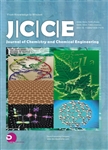Biodiesel Production from Waste Cooking Oil by Enzymatic Catalysis Process
Biodiesel Production from Waste Cooking Oil by Enzymatic Catalysis Process作者机构:Department of Biology and Chemistry University of Sinaloa Culiacan 80007 Mexico Department of Chemistry National University of Colombia Bogota 11001 Colombia
出 版 物:《Journal of Chemistry and Chemical Engineering》 (化学与化工(英文版))
年 卷 期:2013年第7卷第10期
页 面:993-1000页
学科分类:081702[工学-化学工艺] 08[工学] 0817[工学-化学工程与技术] 081701[工学-化学工程]
主 题:Biodiesel waste cooking oil transesterification reaction enzymatic catalysis biofuel
摘 要:Biodiesel is an excellent option for reducing dependence on fossil fuels with environmental advantages by reducing hazardous emissions. The enzymatic transesterification has attracted the attention of researchers in the last decade and the advantages of enzymatic catalysis show that the production of biodiesel by this route has good potential, mainly because it is friendly environment. For biodiesel, production process by enzyme catalysis is chosen the response surface methodology. It is an experimental strategy to find the best operating conditions oftransesterification reaction to improve the biodiesel quality. The Process has three variables: temperature, molar ratio oil-alcohol and catalyst quantity. The process was monitored by GC-FID (gas chromatography with flame ionization detector). The yield of the transesterification reaction by enzymatic catalysis decreases with increasing temperature, and may be due to inactivation of the enzyme by denaturation at temperatures above 50 ℃. The second-order design used was the "CDC (central design composition)" which produced a maximum yield of 95.5% in the transesterification reaction by enzymatic catalysis obtained at a temperature of 45 ℃, molar ratio methanol:oil of 8:1 and a catalyst loading of 8% wt.



